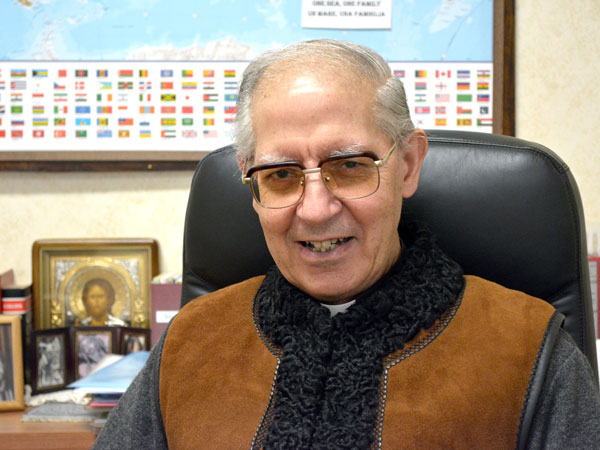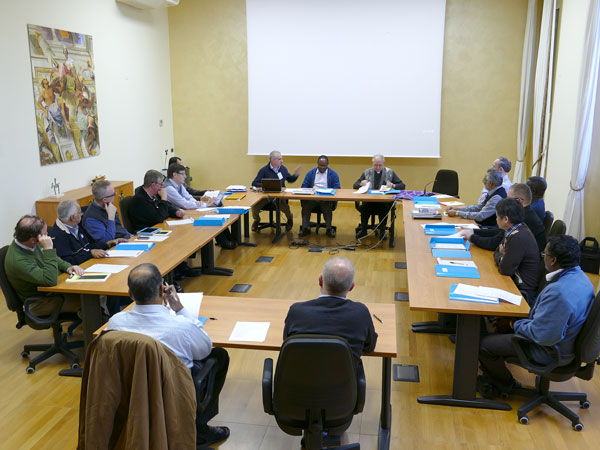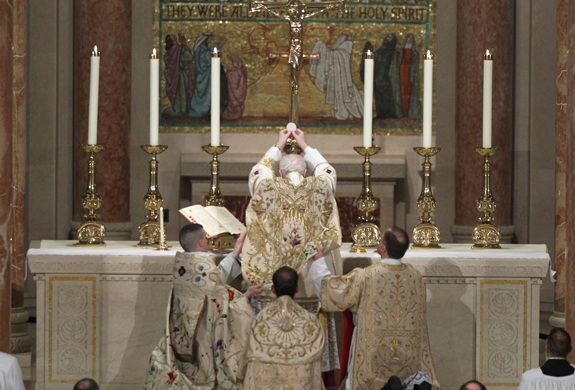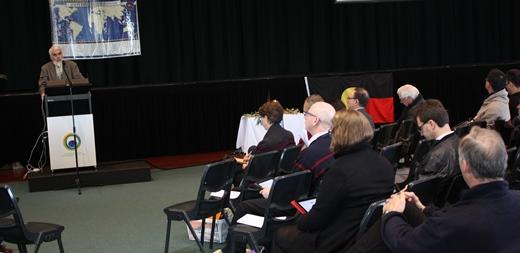The 36th General Congregation

The 36th General Congregation will begin with the Eucharist, celebrated on the evening of 2 October 2016. The first plenary session will take place on 3 October 2016, the Feast of St. Francis Borgia, at the General Curia in Rome.
“Meditating on the call of the Eternal King, what do we discern to be the three most important calls that the Lord makes to the whole Society today?”
“It is providential that we, as a Society, are beginning this journey towards GC 36 just as the Year of Consecrated Life begins. In his beautiful “Apostolic Letter to All Consecrated People” for this year, Pope Francis expresses his hopes that religious such as ourselves might rediscover the joy of consecrated life, recover our prophetic witness that “wakes up the world,” truly become “experts in communion,” and go “out of ourselves to the existential peripheries.” He asks that all religious discern “what it is that God and people today are asking of them.” This is precisely the kind of deep discernment we as a Society are called to make.”
Rev Fr. Adolfo Nicolás, S.J.
Superior General of the Society of Jesus
Letter of Father General on Re-creating the Apostleship of Prayer

On January 3rd 2015 Father General has written a letter to all Society on Re-creating the Apostleship of Prayer. “As we celebrate the Nativity of the Lord in this season, I cannot help recalling our personal and apostolic life depends greatly on the importance we give to our prayer, which should be centered on our mission and on direct contact with the world that surrounds us. Pope Francis reiterates this in many ways for all the faithful, and he does so quite directly and particularly for us in the Society. In a number of personal meetings I have had with him, he has fervently urged that we persevere in prayer as the most valuable resource for our apostolic mission and our personal wellbeing.
Encouraged by this counsel of the Pope, I want to remind you today, on the titular feast of the Holy Name of Jesus, of the Society’s commitment to the Apostleship of Prayer. As is well known, this movement of ecclesial prayer was born in the bosom of the Society 170 years ago, and from the start it possessed a profound missionary sense and was intimately united to prayer for the intentions of the Pope. Over the years, the Popes have confirmed the Society in this ecclesial service which seeks to promote prayer as an apostolic activity of the faithful.” Then he adds: “In an effort to recover the original richness of the devotion, a few years ago I proposed to those responsible for the Apostleship of Prayer that they undertake a process of renewal for this ecclesial service.”
After recalling the previous efforts at renewal, Father General stresses that: “I am aware that re-creating the Apostleship of Prayer will be a long process, which will inevitably require personal conversion on the part of all of us involved in it. Its great strength is that it makes an effort to provide a simple, effective, and fresh way for people to offer the whole of their lives to the Lord from a missionary and apostolic perspective. I urge the whole Society to embrace this proposal with enthusiasm and to implement it with dedication. Its aim is to create a global network of prayer for the needs of the Church and the world.” The letter ends with some recommendations tom the Major Superiors.
Fr. General Arrives in Hong Kong

13 January 2015, the first day of the arrival of Fr. General along with two of his Assistants, Frs. Antoine Kerhuel and Daniel Huang, commenced with visiting Jesuit places and meeting the Jesuits of Hong Kong and Macau.
Fr. General is on a two weeks long visit to the Asia Pacific; during which he will visit the provinces of China and Vietnam. He will be participating in the commemoration of the 400th anniversary of the arrival of the first Jesuit in Vietnam.
He will also attend the conference of the Provincials of the Asia Pacific. (Photo courtesy: Daniel Huang).
Shaping a Shepherd of Catholics, From Argentine Slums to the Vatican
The Great Reformer

The Great Reformer:Francis and the Making of a Radical Pope
Author:Austen Ivereigh
Publisher:Henry Holt and Co. Buy
ISBN:9781627791571
Review by James Martin, SJ
The most controversial incident in Jorge Mario Bergoglio’s tenure as Jesuit provincial (that is, regional superior) of Argentina came in 1976. Father Bergoglio, now Pope Francis, was a prayerful man, a charismatic leader and a priest deeply committed to the poor. As Jesuit provincial, he was also charged with the care of Jesuit priests and brothers throughout Argentina. A few years after taking office at the alarmingly young age of 36, he was faced with the thorny problem of how best to support two priests, Orlando Yorio and Franz Jalics, who had moved into a slum in Buenos Aires and were advocates for the poor in the face of brutal government opposition during Argentina’s so-called Dirty War.
Father Bergoglio supported the work of those referred to as slum priests, but warned the two of the dangers inherent in their ministries. Around the same time, Father Yorio sought approval for his final vows as a Jesuit. Because of suspicions about his work, the evaluations Father Bergoglio received from other Jesuits were largely negative. Some Jesuits in Rome, according to Austen Ivereigh, author of “The Great Reformer,” a fine new biography of Pope Francis, also believed rumors that the two were linked with guerrillas, and so their community in the slums was ordered disbanded.
As a compromise, Father Bergoglio suggested they continue their work with the poor, but live in a nearby Jesuit community. Rather than abide by his request — which they were obliged to do under their vow of obedience — the two decided to leave the Jesuits. Shortly afterward, they were captured and tortured by military forces, who held them captive for several months. Father Bergoglio worked furiously behind the scenes, going to what Mr. Ivereigh calls “extraordinary lengths” to secure their release.
Nonetheless, rumors persisted that Father Bergoglio had betrayed them. Until his death in 2000, Mr. Yorio remained bitter toward his former superior. Father Jalics, however, chose to remain a Jesuit and, ultimately, had a tearful reconciliation with his former provincial, then the archbishop of Buenos Aires. By then, it had become clear that the two had been abducted because a lay teacher who had become a guerrilla had given up their names under torture.
Mr. Ivereigh also convincingly shows how Father Bergoglio quietly provided sanctuary for, and even smuggled out of the country, several people persecuted by the Argentine junta, a story told in another new book, Nello Scavo’s “Bergoglio’s List” (Saint Benedict Press).
The complicated story of the abducted priests is told well in Mr. Ivereigh’s comprehensive book, subtitled “Francis and the Making of a Radical Pope.” Mr. Ivereigh, a Roman Catholic journalist who was briefly a Jesuit novice in the late 1990s, shows how the qualities that have made Francis a beloved pope were long part of his life, first as a young Catholic, then as Jesuit novice director and provincial, and finally as bishop and archbishop. These attributes included a deep piety nourished by his family, the fierce intelligence recalled by former classmates and a lasting love for the poor. While a teenager, and earning his living as a doorman at a tango bar (yes, the pope likes to tango), he told a friend that he wanted to be a Jesuit so he could go out into the neighborhoods “to be with people.”
Because of his popularity as Jesuit provincial, particularly among younger Jesuits, Father Bergoglio was seen as a threat by some. During a period of volcanic change in the church, he tried to steer Argentine Jesuits away from what the French theologian Yves Congar called “false reform” and toward “true reform.” And it was Father Bergoglio who discerned between the two, rankling not a few Jesuits.
As a consequence of this, and of decisions that he later ruefully called authoritarian, the province grew increasingly divided. Some of those sentiments lingered until a few days after his election as pope, when he called the Jesuit superior general, leader of the order, in Rome to re-establish warm relations. When he identified himself, the astonished telephone operator at the Jesuit Curia said his first thought was, “Sure, and I’m Napoleon.”
While running the archdiocese of Buenos Aires, Archbishop Bergoglio showed the same impulse toward simplicity and love for the poor that have become the hallmarks of his papacy. He inveighed against priests who display “spiritual worldliness” and told Elisabetta Piqué, a journalist for La Nación in Argentina (and the author of another fine biography, “Francis: Life and Revolution,” Loyola Press): “In Gospel terms, every elevation implies a descent; you have to abase yourself in order to serve better.”
He was an innovative archbishop, reaching out to political leaders who opposed the church and establishing close friendships with Christian leaders, rabbis and imams. In 2004, he became the first bishop to visit the Islamic Center of the Argentine Republic. Mr. Ivereigh deftly shows that much as Pope Francis (and I) believe that the Holy Spirit, in the pope’s words, “changed” him after his election, the same radical openness that the world now sees in Vatican City characterized his life in Buenos Aires.
The most controversial part of Mr. Ivereigh’s book has proved to be a passage describing Cardinal Bergoglio’s election as pope. Mr. Ivereigh writes that Cardinal Bergoglio gave his assent to a group of four cardinals (including Cormac Murphy-O’Connor, the former archbishop of Westminster, for whom Mr. Ivereigh once worked) who were planning to gather support for his candidacy. (Such assent is verboten in conclaves.) All four cardinals have denied this, and the author has said he would amend the sentence in future editions. But the coalescing of groups behind prospective popes is part of the conclave process, and the Holy Spirit can work through that as well.
Mr. Ivereigh’s book is particularly good on Pope Francis’s Jesuit background and the effects of his provincialate on the Argentine Province. There are times when you wish for a firmer editor’s hand (for example, in the lengthy descriptions of Argentine politics) and greater sourcing. (We are told that his objectives in the Dirty War were set by the Jesuit Superior General, but with no footnote.) And there are a few inaccuracies. A few journalists mentioned Cardinal Bergoglio as a likely candidate to become pope, but Mr. Ivereigh says “none” of the Vaticanologists listed him. But over all, this book is fair, judicious and compelling.
Even though I’ve read several books on my brother Jesuit, many stories about the pope in “The Great Reformer” were new to me. The most revealing was a throwaway line about where the archbishop of Buenos Aires liked to spend his downtime. Mainly in the slums, one colleague said. “It nourished him, being with ordinary people.” I can think of no better background for being pope.
【R.I.P.】Fr. Nepomucenus Wang Yuan-ming went peacefully to the Lord

Fr. Nepomucenus Wang Yuan-ming went peacefully to the Lord on November 30,
2014 at the Infirmary in Taipei at 1:50 p.m.
Fr. Wang was born in Shanghai on May 17, 1926. He entered the Society in Xujiahui
(Zikawei), Shanghai, on Aug. 30, 1947, was ordained to the priesthood on April 5, 1959
at the Sacred Heart Church, Hsinchu, Taiwan, and made the last vows on Feb. 2, 1962 in
Manila.
All priests of the Chinese Province will celebrate one Mass first intention for Fr.
Wang’s eternal rest. Those who are not priests will offer one Mass and Communion and
recite one “corona”. The members of St. Robert Bellarmine community will offer two
Masses, etc.
Yours in Our Lord,
Luciano Morra, S.J.
Socius
Farewell Fr Jean Lefeuvre !

by Benoit Vermander,S.J.
Within a few days of each other, two good friends of Renlai, who were also towering missionary figures of Taiwan, have left us. Their life accomplishment deserves to stay with us in memory. It is with emotion and gratitude that we remember these two French Jesuits who both gave more than fifty years of their life to Taiwan and its people.
再見,雷公!
一代智者仁者──雷煥章神父 Fr Jean Lefeuvre went peacefully to Heaven on the evening of Sep. 24, 2010 at the Cardinal Tien Hospital, Taipei. Born in France, in 1922 雷公 (as he was called by his Taiwanese friends) entered the Society of Jesus in 1940, and was ordained to the priesthood in 1952 at St. Ignatius Church, Shanghai by Msgr. Ignatius Kung Pin-Mei. In his book, “Les enfants dans la ville” (The children in the town) he has left a vivid description of this troubled period for the Church in China.
After arriving in Taiwan Fr. Lefeuvre became a founding member of the Taipei Ricci Institute, and worked closely with Fr. Yves Raguin. He became a world authority on oracle inscriptions, and later, on bronze inscriptions as well. He published several catalogues of oracle inscriptions as well as several learnéd articles and research tools on this very specialized field of knowledge. Fr. Lefeuvre was probably the most important collaborator and author of the “Grand Ricci” dictionary, in charge of its etymological section. He leaves a completed manuscript of a Dictionary of Bronze Inscriptions, which will be published after the due process of revision.
He was also a pastor, founder of several Christian communities, and exercised an far-reaching influence on the Taiwanese church. In the “Aurora Center”, which he directed for decades, he was the first to welcome Taizé-style prayer groups.
Fr. Lefeuvre was passionate about bronze inscriptions. He saw in them the most ancient testimony of the concepts of “territory” and “ancestors’, central in the development of Chinese thought. His research made him also very sensitive to the spirit of popular religion, and he surprised many Taiwanese by his deep insight about the significance of Tudigong (土地公) or Mazu (媽祖) in the Taiwanese religious psyche. It is in these ways that one can call him a pioneer of inculturation.
Though handicapped during his last years by the loss of his hearing and the partial loss of his sight, he worked indefatigably until the end. Fr. Lefeuvre is mourned by members and friends of the Taipei Ricci Institute and Renlai. His absence will be deeply felt by all of us.
International Conference on Ignatian Spirituality 2014
 |
This year, the Society of Jesus around the world celebrates the 200th anniversary of Restoration. To commemorate this, all the Jesuits and the related Ignatian families are called to a deeper reflection and renewal of our vocation in following Christ.
Xavier House-Ignatian Spirituality Center, faithful to Ignatian tradition in this juncture of history, wants to follow the inspiration of St. Ignatius to draw out the treasure of his legacy for our times. Taking this opportunity, we are going to organize an Ignatian Spirituality Conference as the summit of this celebration.
In this Conference, apart from the keynote speeches by renowned international speakers, there are also a selection of workshops with various interesting and practical topics to foster spiritual conversations and further learning.
We cordially invite you to join this Ignatian journey, to share, refresh and reflect together in this meaningful gathering. We hope that this conference also serves as our ongoing and deepening journey to God, with Ignatius as our guide and companion.
Conference Overview
Official Website: http://goo.gl/yqo8RG
Finding What Should Never Have Been Lost: Priests and the Extraordinary Form

After Pope Paul VI introduced the Novus Ordo Mass in 1969, the older form of the Roman rite-sometimes known as the Tridentine Mass, the Old Mass, the Traditional Latin Mass, and, more recently, the Extraordinary Form-virtually disappeared from many dioceses. Its celebration was severely restricted, if not banned outright, and became a source of controversy.
A yearning among some for the older form of the Mass, coupled with decisions by Popes John Paul II and Benedict XVI, led to its wider use and to a de-stigmatizing of its celebration over the years. The most significant of these decisions was Pope Benedict’s 2007 motu proprio Summorum Pontificum, which declared that any priest may celebrate the older form of the Mass on his own without special permission from a bishop. Today, attendees of Extraordinary Form Masses are often younger Catholics, as the number of older Catholics who remained devoted to the pre-1969 Mass dwindles.
Catholic World Report spoke to four priests who regularly celebrate the Extraordinary Form of the Mass, each of whom has spent most of his life attending, and most of his priesthood celebrating, the Novus Ordo.
The Planet Is Our Home

There is no institution so old that it has nothing left to learn – and the Catholic Church must commit to learning about and changing its practices in relation to ecological issues. This was the message from Colombian Jesuit Fr José Mesa, Secretary of Primary and Secondary Education at the Jesuit Curia in Rome and one of the keynote speakers at the JCAP Education Colloquium in Sydney.
Titled The Planet is Our Home, the colloquium brought together nearly 100 delegates from nine countries across the Jesuit Conference of Asia Pacific to discuss the role that Jesuit schools can play in reconciliation with creation.
“We have to be wary about a tradition that is simply replicating what is done in the past,” said Fr Mesa. “We have seen the natural environment as a raw material for our own comfort, but now we need to see ourselves as part of the natural world.”
“We don’t see problems, we see challenges and solutions, because we believe God is working with us,” he said.
JCAP Colloquium small groupKnowing how successful the JCAP Education Colloquium in Fukuoka in 2010 had been, planning for this colloquium began some 10 months earlier under the energetic leadership of Jennie Hickey, Sharon McLean, and Sue Martin. Fr Christopher Gleeson SJ, JCAP’s Secretary for Basic and Secondary Education, said that a decision was taken in the early planning phase to focus the Colloquium on one of the Society’s highest priorities and greatest challenges – Reconciliation with Creation. Each of the three days had its particular sub-theme: theology and spirituality of creation; reconciliation with creation globally; and best practice in reconciliation with creation.
Fr Mesa’s opening address was followed by eminent Australian theologian, Fr Denis Edwards, and Dr Pat Fox, a Mercy Sister and specialist in Ignatian spirituality. “Their theological and spiritual inspiration underpinned the whole Colloquium for us and provided what St. Ignatius would call an excellent composition of place,” said Fr Gleeson.
On day two, the Colloquium looked out on our globe. Fr Benny Juliawan SJ from Indonesia provoked the delegates with questions about teaching justice to today’s generation. He said that progress is one of the driving forces of the destruction of our planet, and that Jesuit schools are partly responsible for instilling this drive in students. This presents a conflict between the ideal of an entrepreneurial self and the Jesuit concept of men and women for others, and challenges schools to encourage a student body which sees service of others as more fulfilling than material achievement.
“There is no place in our schools for a faith that keeps things merely personal and is divorced from the concerns of the world. Solidarity should be real in the perspective of students.”
This led into hearing a young Riverview alumnus, David Lukas, sharing his story about leaving the law and financial sector to begin his own company helping businesses to manage their energy, and another engaging speaker – Jacqui Remond, Director of Earthcare Australia.
Wisdom Story

有一天,當地的牧師去拜訪一些教友誰了十幾歲的兒子的家。家長擔心什麼職業他們的兒子會選擇,所以牧師說他有一個簡單的測試,可以預測什麼將成為他。
他把三個對象放在桌子上,讓年輕人選擇他想有哪一個:一本聖經,錢包和一瓶蘇格蘭威士忌。如果男孩選擇了聖經,他可能會成為一名牧師,如果他選擇的錢包,他會是個銀行家,如果他選擇了瓶子,他會成為一個毫無價值的流浪漢。
所以父母叫他們的兒子進了房間,和牧師告訴他,他可以有任何的對象,他希望。當男孩立刻拿起三個,牧師哭了出來,“但願!他將是一個耶穌會!”
[如果你想知道智慧是在這個故事是什麼,請記住今天的日期。4月1日也被稱為…]






